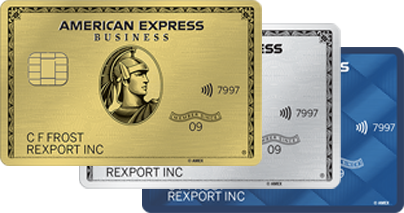
How Do Corporate Credit Cards Work?
By Megan Doyle | American Express® Freelance Contributor
5 Min Read | November 13, 2020
Summary
Corporate credit cards are like a souped-up version of traditional business credit cards. While providing financial flexibility for employees, corporate credit card accounts can help businesses closely manage spending.
Corporate cards offer many of the usual business credit card benefits, but companies must meet stricter requirements to open an account.

Compared to standard business credit cards, corporate credit cards are tailored to businesses of all sizes – that desire more robust tools to manage their finances and monitor employee spending. The difference isn’t necessarily about size, but about management needs and approaches. However, companies often must meet some strict requirements in order to open up a corporate credit card account.
For businesses looking to kick things up a notch, here’s a rundown of how corporate credit cards work.
What Is a Corporate Credit Card?
Corporate credit cards are cards that let employees pay for authorized business expenses while offering features that make it easier for companies to manage and track finances. For example, businesses may have access to tools and resources like dashboards to help track and control employee spending, and businesses may hire a program administrator to run the account. Corporate credit cards also tend to offer traditional credit card rewards and perks like frequent flyer miles and airport lounge access.
How Do Corporate Credit Cards Work?
While they provide typical credit card benefits, corporate credit cards are designed to meet the needs of companies that desire more full-bodied, customizable financial tools to track and control employee spending. They also have several unique characteristics that influence how they work.
Corporate credit cards are issued based on the business’ financial health and typically do not require a personal guarantee. This means that if the company goes under without having paid its bills – during an unforeseen economic crisis, for example – the business owner is not held responsible. Business cards, on the other hand, usually require a personal guarantee or shared liability between business and owner.
Once a corporate credit card is issued, both the company’s name and the employee’s name will appear on the card. Each employee typically gets their own individual credit card number, even though expenses roll up to a single corporate account. Since many employees might be issued a corporate credit card, businesses typically create guidelines for authorized expenses. Corporate credit card guidelines can be highly customizable. For example, companies can set limits on how much cardholders can spend per transaction or at which merchants they can make purchases.
Guidelines and policies can get even more granular. Companies can set department- or position-specific rules, for example, meaning middle management can have a different spending profile than a company executive.
Company guidelines can help businesses better manage employee expenses, but it’s also important to make sure employees know the rules to prevent misunderstandings and unauthorized charges. It’s not uncommon for businesses to develop a corporate credit card agreement for employees that details the company’s rules and expectations for corporate credit card usage.
Depending on the card issuer, businesses may have to pay a yearly fee for each corporate credit card issued.

Who’s Responsible for Paying a Corporate Credit Card Bill?
How corporate credit card bills are paid depends on the card issuer and card type. Often, card issuers offer companies a choice in how they want to determine payment liability.
Individual liability. Employees receive individual bills and are responsible for directly paying the card issuer for any charges, all while filing an expense report to get reimbursement from their employer. The card issuer will likely check each employee’s credit before providing them a credit card, but it’s a soft credit pull so their credit score likely won’t be affected.
Corporate liability. The business receives and pays the bill for all approved charges, and is responsible for all debts. However, depending on a company’s corporate credit card guidelines, their employees may have to pay unauthorized expenses out of pocket, and may still be responsible for filing regular expense reports. Corporate credit card issuers with corporate liability generally won’t check each employee’s credit, and such cards won’t affect employee credit scores for better or worse.
Joint liability. Both the employer and employee are responsible for the debt, but specifics generally depend on the card issuer’s terms and the company’s preferences. Put simply, the card issuer can pursue either the employer or employee in the case of an unpaid balance.
Understanding Corporate Credit Card Requirements
Traditionally, corporate credit cards were designed for larger, established corporations. But times are changing, and there are now corporate credit card offerings for businesses of any size, including startups. Still, requirements tend to be stricter than getting a standard business credit card, and specifics will depend on the card issuer. For example, to open up a corporate credit card account, a business might need:
- A minimum annual revenue or business bank account balance, often upwards of $2 million.
- A certain minimum number of employees.
- Minimum yearly credit card charges, such as $250,000 or more.
- Registration as an LLC, S, or C corporation.
Corporate credit card issuers might also look at a company’s business credit score, recent audited financial statements, tax info, and more.
The Pros & Cons of Corporate Credit Cards
Corporate credit cards can be an effective tool for businesses looking to streamline, track, and control employee expenses, but there can be some disadvantages if you’re not careful.
Pros:
- Financial relief for employees since they don’t have to pay for business expenses upfront.
- Streamlined tracking and management of employee expenses.
- Usually no personal guarantee, so a business owner’s personal assets are protected.
- Rewards and perks like airport lounge access, rental car insurance, and frequent flyer miles.
Cons:
- Employees might put personal expenses on a corporate credit card.
- Employees may feel free to spend more when on business travel or hosting clients.
- Clear corporate credit card guidelines must be established to prevent unauthorized charges.
- Corporate credit cards aren’t covered under the CARD Act of 2009, which aims to protect consumers. However, some card issuers have extended some or all CARD Act protections to corporate credit card holders in their terms and conditions.

Business Credit Cards done right
From travel benefits to cash flow management, we've got a Card for you.






